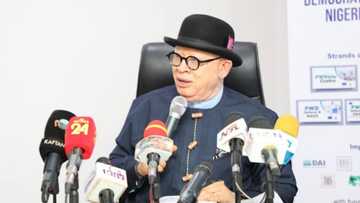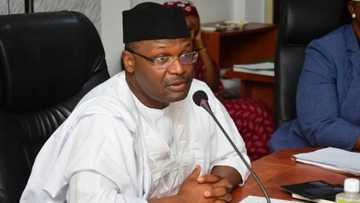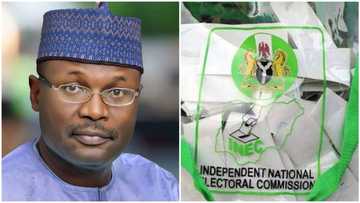Inspiring Confidence in BVAS, Electronic Transmission of Results: 7 Urgent Actions for INEC – Samson Itodo
Editor's note: Samson Itodo is a pioneer electoral observer. In this piece, he explains why the advent of technology in the Nigerian electoral practice will prove pivotal to the 2023 general election while prompting INEC of the need to be proactive.
Africa’s biggest election will hold in February 2023 in Nigeria. It’s the seventh successive general election in Nigeria’s 23 years of unbroken democratic expedition.

Source: Facebook
With ten million new voters added to the voters’ roll, an estimated 95 million registered voters will vote in 176,846 polling units distributed across 774 local government areas.
A total of 12,163 candidates sponsored by 18 political parties are on the ballot for election into 109 senatorial districts, 360 federal constituencies, 993 state constituencies, 28 governorship positions, and the Office of the President.
The election is conducted against the backdrop of a new electoral law and innovations introduced by the Independent National Electoral Commission (INEC) to enhance electoral integrity and inspire public confidence in the electoral process.
PAY ATTENTION: Share your outstanding story with our editors! Please reach us through info@corp.legit.ng!
In the final analysis, the effective implementation, or lack thereof, of these new electoral technologies will play a significant role in assessing the integrity of the 2023 general elections.
The Bimodal Voter Accreditation System (BVAS) and INEC Election Result Viewing Portal (IReV) are two technological innovations celebrated for enhancing the transparency of election results and boosting public trust in electoral outcomes in recent elections.
INEC asserts that these technologies are addressing the ten most pervasive weaknesses in Nigeria’s election result management process, which include falsification of votes at polling units, falsification of several accredited voters, collation of false results, mutilation of results and computational errors, swapping of results sheets, forging of results sheets, snatching, and destruction of results sheets, obtaining declaration and return involuntarily, making a declaration and return while result collation is still in progress and poor recordkeeping.
Both tools perform mutually reinforcing and critical functions in elections. The BVAS is a technological device used to identify and accredit voters’ fingerprints and facial recognition before voting.
The device is also used for capturing images of the polling unit result sheet (Form EC8A) and uploading the image of the result sheet online.
IReV is an online portal where polling unit-level results are uploaded directly from the polling unit, transmitted, and published for the public.
At the front end of the online portal, members of the public can create personal accounts with which they can gain access to all uploaded results stored as PDF files. This accessibility of polling unit-level results increases transparency and public trust in the process.
Despite improving public confidence in electoral outcomes, the introduction of BVAS and IReV is anathema to political actors determined to subvert the people’s will at all costs.

Read also
2023 elections: Tinubu, Atiku, Obi shiver as INEC sends strong warning to political parties in Nigeria
It is, therefore, not surprising to learn of alleged attempts to torpedo INEC plans to safeguard the integrity of the election using the BVAS and IReV.
A case in point is the litigation instituted in the Imo State High court seeking a restraining order against INEC to suspend the deployment of the BVAS for the general election.
Across the world, the introduction of electoral technologies has attracted contestations and controversies driven mainly by its propensity to enhance election credibility and undermine public trust in elections, especially when electoral technologies are compromised.
Most importantly, electoral technologies ensure efficiency in election administration and limit human interference with the electoral process.
As these technologies evolve, attempts to compromise them heighten. Elections can be stolen, and voter choices upturned by compromised election officials with a click of a button.
Tech tools may also be subjected to disruptive cyber-attacks. These issues amplify the essence of greater transparency by election management bodies to increase public trust and confidence in electoral technologies.
Therefore, to increase the trust quotient in the BVAS and IReV, INEC should implement the following actions as a matter of urgency:
BVAS Software OptimizationEfficiency in the delivery of electoral services builds public trust. The BVAS software should be modified and upgraded to improve voter accreditation and picture quality.
Its IOS should be upgraded to introduce a feature that enables the camera to detect or capture/focus on the object of interest, such as the entire result sheet. In addition, a PDF compression script should be integrated into the portal to ease downloads of election results.
Timely conduct of pen*tration tests and mock exercises
In Kenya, the electoral commission is under a mandatory duty to test, verify and deploy technology at least sixty days before a general election. Nigeria’s Electoral Act has no similar provision. Notwithstanding, INEC has conducted simulation exercises for the BVAS in the past.
While the 105 elections may be considered mock exercises for the BVAS and IReV, the high volume of information exchange, data processing, and transmission involved in the general election is incomparable to those elections.
This is why pen*tration tests and mock exercises are required to assess the robustness, efficiency, security, and capacity of INEC servers and devices before their eventual deployment for the general election.
Pre-deployment tests should be based on an extensive and representative methodology that integrates stakeholder consultation and public participation. Sharing the outputs of the test/exercises will enlist public support for the BVAS and IReV, just as creating opportunities for independent verification and audits of electoral technologies will be pivotal to inspiring public confidence.
While there has been no successful cyber-attack to date on the BVAS and IReV, the public will require assurances of the durability, reliability, and robustness of INEC’s tech defense system.
Electronically transmit and publish voter accreditation data on the IReV
In addition to the transmission of polling unit-level results, INEC should electronically transmit and publish the number of accredited voters on the results viewing portal.
The BVAS stores the number of accredited voters; however, the stored data is not transmitted electronically or published on the IReV portal. Electronically transmitting the number of accredited voters is in accordance with Section 64(4)(5)(6) of the Electoral Act 2022, which provides that the number of accredited voters recorded and transmitted directly from the polling unit shall be considered in the collation and announcement of results.
Upload and transmit the ward collation results (Form EC8B) on the IReV
To deepen the transparency of the collation process, the Form EC8B, Ward collation result sheet should be uploaded on the IReV portal at the close of collation at the ward level.
This serves as ward collation oversight, the weakest link in the election results value chain. Uploading the collated results sheet will facilitate monitoring and tracking of the results collation process by citizens and stakeholders.
Increase the processing power of the IReV
According to INEC, the IReV has been deployed in 105 elections involving 16,694,461 registered voters since it was first introduced in the 2020 Nasarawa Central bye-election.
In these elections, 32,935 results sheets (Form EC8A) were uploaded from polling units in rural and urban areas, including polling units in communities affected by insecurity.
For the 2023 Presidential and National Assembly election, 530,538 results sheets (Form EC8A) will be uploaded on the IReV portal. It will be the portal’s first processing of this volume of results data.
Therefore, INEC should increase its servers’ bandwidth, RAM size, and storage capacity to improve the processing power of the IReV portal and ensure public access to results uploaded on the portal. The BVAS and IReV should be configured to manage multiple requests due to the huge traffic on election day.
Adopt a new approach to the training of election officials on electoral technology
Based on the recent deployment of the BVAS and IReV, there is a relationship between the quality of the election staff and management of the device and the quality of results sheets uploaded on the results viewing portal.
In a recent Election Results Analysis Dashboard (ERAD) report, poorly captured images of results sheets and incorrect or incomplete forms were uploaded on the IReV.
INEC should make a significant investment in the training of polling unit officials, with a special focus on result transmission, ballot paper accounting as well as the capturing of polling unit results using the BVAS.
All poll officials with the responsibility of handling the BVAS should undergo practical simulation sessions using the BVAS before election day. Expectedly, this policy action will address the capacity deficits.
Introduce official forms for reporting the cancellation of results at the polling unit
Currently, polling officials upload handwritten letters on sheets of paper to report cases of cancellations of results at the polling units. To ensure consistency, clarity, and transparency, INEC should introduce a form like Form E40G for reporting the cancellation of results at the polling unit to avoid upload of documents not relevant to the IReV or handwritten letters.
Conclusion
In elections, perception is everything. Introducing the BVAS and IReV into the framework for election results management has transformed the public perception of the accuracy and credibility of election results. It is one of the most significant innovations and reforms to Nigeria’s electoral process.
Therefore, INEC, civil society, and citizens’ insistence on using BVAS and IReV for the 2023 elections are justified. The urgent policy actions outlined above will ensure the BVAS and IReV performs optimally when scaled up for the general election.
In 2023, Nigerians want to go to polls with the assurance that the BVAS and IReV will protect their vote. I believe it will.
Disclaimer: The views and opinions expressed here are those of the author and do not necessarily reflect the official policy or position of Legit.ng.
Your own opinion articles are welcome at info@corp.legit.ng— drop an email telling us what you want to write about and why. More details in Legit.ng’s step-by-step guide for guest contributors.
Contact us if you have any feedback, suggestions, complaints, or compliments.
Source: Legit.ng










